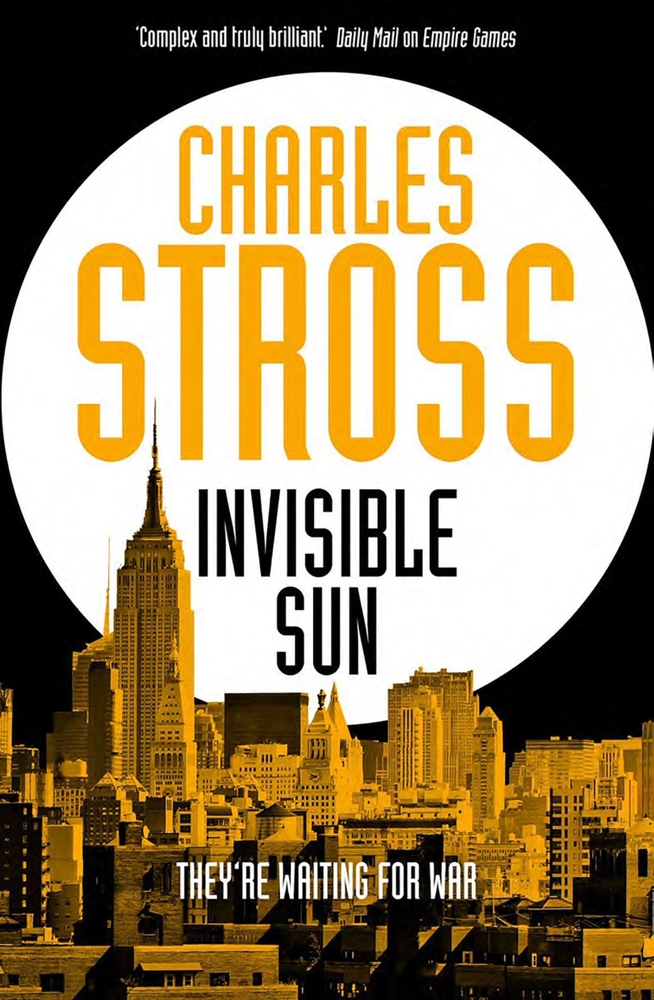 The alternate timelines of Charles Stross’ Empire Games trilogy have never been so entangled than in Invisible Sun—the techno-thriller follow up to Dark State—as stakes escalate in a conflict that could spell extermination for humanity across all known timelines.
The alternate timelines of Charles Stross’ Empire Games trilogy have never been so entangled than in Invisible Sun—the techno-thriller follow up to Dark State—as stakes escalate in a conflict that could spell extermination for humanity across all known timelines.
An inter-timeline coup d’état gone awry.
A renegade British monarch on the run through the streets of Berlin.
And robotic alien invaders from a distant timeline flood through a wormhole, wreaking havoc in the USA.
Can disgraced world-walker Rita and her intertemporal extraordinaire agent of a mother neutralize the livewire contention before it’s too late?
Please enjoy this free excerpt of Invisible Sun by Charles Stross, on sale 09/28/2021.
Drowning in Berlin
BERLIN, TIME LINE TWO, AUGUST 2020
Elizabeth Hanover scuttled along the grimy sidewalk, her shoulders hunched and eyes down-cast, running away from the sour fear-stink of a rendezvous gone wrong.
She was two blocks away from the ground-floor apartment where the Major lay, bleeding and unconscious in the care of questionable strangers, when a thud that reverberated through her rib cage set her heart pounding. Was that a bomb? She wondered. It sounded like a bomb. She’d heard too many of them for comfort in her short adult life. She increased her pace as distant sirens began to rise and fall.
The streetscape of this other-world Berlin was disorienting and unfamiliar. Her Berlin was the fusty regional capital of the French Imperial province of East Prussia. This Berlin was apparently the capital of a united federation of all the Germanies, in a looking-glass world where France was a Republic and the Russias were splintered separate nations. And there was no respite, in any direction she looked, from the reminders of her exile. The people around her went hatless and it seemed both men and women wore trousers. But that was the least of the strangeness. There are no horses, she realized dizzily. No ever-present road apples with their sweet-sick smell of equine droppings, no boys with brooms waiting to sweep the crossings. Did they eat all the horses? Is there a famine? But there were no obvious signs of starvation around her. Indeed, there were signs of outrageous wealth: street-corner grocery stores boasted outrageous expanses of plate glass. Some of the pedestrians talked to themselves, muttering or mumbling as if they were mad, while others walked heedlessly, eyes downcast at small, glowing tablets like the one she’d taken from Major Hjorth.
She’d imagined a future of melted-looking automobiles and streetcars, of flying machines and towers, but the small differences were far more disturbing. An infant pranced by in shoes with soles that flashed blue at every step, its hand held by a mother dressed in a Hussar’s jacket and tight trousers. A brightly lit advertising sign on a passing tram flared an incomprehensible message at her, then dissolved before her eyes into a picture of toothily smiling people. The unfamiliarity everywhere she turned her gaze was exhausting.
Liz gripped the torn messenger bag under her arm and moderated her pace to avoid attention. Her heart hammered as a green-striped vehicle roared past, blue beacons flashing from its roofline and siren wailing like a damned soul. Through its windows she glimpsed hard-faced men (or women) in uniform. It was heading towards the block she’d left behind. Major Hjorth’s scheme had clearly failed, attracting the worst kind of attention this world had to offer, and now she was stranded without any idea where to turn for help. Her unease veered towards suffocating panic. The Major’s proposal had looked so excitingly promising when she awakened this morning! But now it seemed like a snare into which she had thrust her head, and from which she could not withdraw.
Major Hjorth’s plan had gone off the rails when he’d been shot by Elizabeth’s guards. His body armor hadn’t quite stopped the bullet he took during her extraction. He’d brought her to his apartment and collapsed so she’d taken the glowing slab of glass he called a phone, but it stopped working for her, demanding that she look at it or enter some sort of code. A stranger called Fox turned up, then called a medic, and then the doorbell rang again. Scared, Liz had grabbed the Major’s bag with his holdout pistol and bolted through the back door. A minute later there had been an explosion, then the gendarmes converging behind her like black uniformed wasps . . .
She came to a platform beside a streetcar stop. It had a rain shelter and some uncomfortable looking furniture. Liz paused and leaned gingerly against the unfamiliar plastic rails of the seat. The cumulative sense of strangeness, relentless and disturbing, threatened to drown her but she made herself take deep, measured breaths, and fought back the urge to panic while she took stock of her situation. What should I do now? She wondered.
She remembered the Major’s words: “We’re safe from Captain Bertrand, but this is not your world. There are other hazards. We’d best get you to a place of safety as fast as possible.” Bertrand had been her chief bodyguard—a polite word for jailer. There are other hazards. This was the world the Commonwealth’s exiled world-walkers had angered. The one that had hunted them back to their original home and cauterized it with corpuscular weapons, if her father’s intelligence briefings were to be believed.
A peculiar flat chime like a recording of real bells announced the arrival of a sleek, glass-walled streetcar. Liz watched, careful to keep her face expressionless, as doors rippled open along its length. She saw no sign of a ticket booth or conductor before the doors hissed closed and the machine whined away. It was eerily quiet for a tram. An illuminated sign on the shelter wall flickered: OSTBAHNHOFF 4Km. Were there two main stations in this Berlin? She shook her head, the tight scarf tugging at her hair. The other people she saw wore very different costumes but paid her little attention, as if she was a servant. Maybe it was her skin color, not just the outfit the Major had provided? She hunched up a little then forced herself to straighten, irrationally angry with herself.
Take stock: she had a nasty-looking pistol she hadn’t trained with, a magic mirror that didn’t work, and a wallet containing some paper money and plastic wafers the size of playing cards (value: unknown). She also had a number of solid gold guineas she’d stitched into her underwear over the past three nights, not trusting the Major entirely, but turning them into local cash required some understanding of how things worked here. She could get by in German and Russian, as well as being fluent in French and English. Stacked against her were: the Major’s posited enemies, whoever they were. (Presumably, they were the ones responsible for the explosion). Whoever Fox had been afraid of—possibly the grim-faced gendarmes in their trucks? And the difficulty of making contact with the Major’s backers. How can I—
An angry hornet buzzed in her bag. Liz squeaked and clamped her elbow tight on it, panicking. The buzzing stopped: moments later it buzzed again. She exhaled, realizing it was a mechanism of some sort. She opened the bag and looked inside. The Major’s phone was vibrating, and it lit up the interior of the bag like a magician’s cave, flashing a cryptic message: INTERNATIONAL CALL, NUMBER WITHHELD. Relief and worry twisted her mind in knots as she fumbled the device out of the bag and held it to her cheek.
“Hello? Is that Elizabeth?”
It was a woman’s voice, tinny and tentative. She spoke English, oddly accented.
“Who is this?” She asked nervously.
“Hello? I can’t hear you—”
Liz turned the device around, upside down, and tried again. “Who is this?”
“Are you Elizabeth? If so, can you tell me the date when you were born?”
Tumblers spun in her head as sleepy summer lessons from Dr. Henkel, her father’s chief of security, slotted into place. “Only if you tell me whose phone this is, first,” she challenged. “Don’t use their name, just identify them.”
“Why? Oh. This phone belongs to the Major, of course.”
Elizabeth’s shoulders trembled with relief and she recited her birthdate.
“Thank you, Elizabeth. I work for Control—we direct the Major. I understand something has gone wrong—”
“Tell me something I don’t know!” she said crossly. “I’m not with the Major right now. Too many people came. I stepped outside and a minute later there was an explosion.” She glanced around furtively, but nobody waited within earshot. “The gendarmes came running. I think it’s too dangerous to go back.”
“You’re absolutely right.” Control fell silent for a second or two. “Elizabeth, you should assume that the Major is dead or captured. We will honor the agreement he made with you if that is agreeable, but it will take us a few hours—possibly a couple of days—to get you out of there. Meanwhile we’re going to make alternative arrangements on the fly. First things first: this phone is your lifeline. But it is probably going to need charging up in a couple of hours, and if its battery goes flat you won’t be able to use it.”
“I can’t use it anyway; it doesn’t recognize my face and it keeps asking for a password—”
“Not a problem if you can memorize this number?” Control recited a six-digit code. “That will get you in. But you absolutely must obtain a booster battery as fast as possible. Did the Major give you any money?”
Elizabeth chewed her lip. “Before I left, I took his wallet,” she admitted.
“Excellent!” To her chagrin, Control sounded approving. “You think quickly: this might just work. Listen, you need to go to one of the S-Bahn or DB—main railway—stations. Use the Major’s transit pass—it’s a plastic card labelled BVG, you tap it on the ticket machine as you board a tram or catch the subway—then when you get to the station you must look for a kiosk. Ask the kiosk owner for a booster battery and get them to show you how to connect it to the phone. Younger ones, under fifty, they mostly speak enough English—”
“I can get by in German.” I hope. “How much will this cost? I don’t know how much money is worth here.”
“Somewhere between five and twenty-five euros is about right. How much do you have?”
Liz rummaged through the Major’s wallet. “Three notes that say one hundred euros. And two fifties.” Also some small change. She rummaged some more. “I found the BVG card.” I think.
“You can buy a cheap restaurant meal and a drink for ten to twenty. Find a kiosk, get a phone charger, take yourself somewhere to eat, and I’ll call you back within the hour with directions to somewhere you can stay the night. Can you do that?”
Liz looked around uncertainly. Another tram was approaching, its electronic chime sounding slightly flat. The moving sign on the front of the streetcar agreed with the sign on the shelter. “I think so,” she said, setting her shoulders. “I’ll try.”
“Take care, then! Control out.” The phone went dark as the tram drew up beside her. Liz slid it in her bag and stepped aboard. Moments later the doors sighed closed and the tram lurched into motion, bearing her away into the streets of East Berlin.
TEMPELHOF AIR FORCE BASE, BERLIN,
TIME LINE TWO, AUGUST 2020
“This isn’t public yet—we don’t want a panic—but we just lost time line four. The Dome, the Bridge, and Camp Singularity: they’re all gone.”
Colonel Smith, formerly of the US Air Force and then the NSA, now led a shadowy unit within the para-temporal division of Homeland Security tasked with countering intruders from other time lines. He stared at his boss’s face on his tablet screen. He’d started the conference call expecting to share some good news for once—a captured enemy agent, just one loose end left to collect—with her. The change of track was jarring. “Damn! How? What’s the impact assessment? Is my side of operations intact or do I need to re-plan?”
His boss, Dr. Eileen Scranton, cut across him. Their conversation was time-lagged by the satellite link across the Atlantic. “It impacts everything, Eric. Over a thousand people got out of the research facility at Camp Singularity—just in time, luckily—but now several thousand more people know what happened there. It’s going to leak, there’s no way to keep an alien invasion secret—”
“—A what? Excuse me, but I could swear you just said the words alien invasion?” Eileen Scranton didn’t play games. At least, not with her core staff: “What?”
Dr. Scranton glared through the video link. Smith shut up, chagrined at his lapse. After a couple of seconds she resumed. “I was supervising an operation at Camp Singularity.” The camp, in time line four, was an archaeological dig site of military significance. The dig was excavating the high-tech ruins of a destroyed para-time fortress. These included a still-functioning gate to a time line where the Earth had been destroyed— compressed down to a planetary-mass black hole—by an as-yet unidentified enemy. “I was there in person. We dropped a space probe through the Gate on a flyby of the hole. It was a reconnaissance mission, but it woke up some kind of weapons platform.”
“A space probe? Which one?” There were at least three probe projects Smith had heard of, all with different goals and factions promoting them. None had been green-lit for launch before now, and he was mildly irritated to find himself on the outside.
“ERGO-1.” A joint Space Command project, with lots of interest from the Air Force. “They were testing the black hole as a tool for gravitational slingshot maneuvers. In case they needed to launch a first strike against the Commonwealth, sending warheads through para-time.” Dr. Scranton looked mildly disgusted at the scheme’s lack of subtlety. “The headbangers on the National Security Council want a bigger club. As you have to liaise with the Commonwealth directly, you were kept in the dark for plausible deniability.”
ERGO-1 was a modified maneuvering bus from a Minuteman ICBM, the platform that aimed and released the nuclear warheads the missile carried. Loaded with instruments instead of bombs, they’d sent it through the Gate as a test. It had been built in a hurry on a budget of mere hundreds of millions of dollars, peanuts for a nuclear weapons program. The objective had been to prove it was feasible to place missile warheads in close orbit around the planetary-mass black hole in the uninhabited time line. If so, they’d be available to carry out a para-time nuclear strike, arriving over their targets without any warning. So the Camp Singularity crew had pushed the test-bed through the Gate between worlds, letting it fall on an orbit passing close to the planetary-mass black hole that had replaced the Earth in that time line.
Viewed with 20/20 hindsight, perhaps it hadn’t been such a good idea after all.
“We accidentally tickled a dragon’s tail, and the dragon woke up.” Dr. Scranton looked as if she’d bitten a chili pepper by mistake instead of a plum tomato.
“What kind of dragon?” Smith asked, fascinated. The alien relics they’d found in the Dome at Camp Singularity had been junk, corroded into inactivity by two thousand years of exposure to the elements. Nobody had expected anything but trash to survive in the high radiation environment close to a black hole.
“It launched some kind of interceptors. They destroyed ERGO-1, then invaded through the Gate. Current consensus is that there was some kind of dormant alien weapons platform down there in the gravity well. In hindsight—we should have anticipated this. I mean, it was on the other side of a gate leading from a multi-dimensional fortress that was destroyed centuries ago. But it was asleep until we accidentally woke it up.”
Crap, crap, Smith swore silently. Eileen’s increasingly rattled delivery suggested that she was really worried: last time he’d seen her like this . . . “What do you want me to do?” he asked.
“For now? Be aware of it, while continuing with the operations in Berlin and New York. The media blackout is holding, but I think it’ll leak to the public within days at the outside and then we’ll have to re-plan everything. We’re desperately short of information right now, although steps are being taken to remedy that on the ground. Meanwhile, the potential for embarrassment in front of the Commonwealth is extensive. I’m bringing it up because we showed Rita Camp Singularity.” The corners of Eileen’s mouth turned down. Smith had recruited and trained Rita Douglas as a world-walking agent of Homeland Security. She was currently assigned to a diplomatic mission in the Commonwealth. There she’d met her birth mother, Miriam, who was high up in the Commonwealth government and also, for unrelated reasons, at the top of the FBI’s Most Wanted list. Her psych profile said she was loyal and she’d been carefully primed to mistrust Miriam—and the Unit had her on a leash via her family and girlfriend—but Smith knew better than to trust anyone unconditionally.
“Do we have reason to believe the Commonwealth know about time line four?” Eric asked cautiously.
“It’s not impossible. There were signs that world-walkers from the Commonwealth visited the Dome before we discovered it. But the mess could have been made by their people—or by someone else. Maybe there were survivors from the Dome’s garrison?” (She clearly assumed that the archaeological evidence suggesting the Dome was a para-time fortress was correct.) “Or it could have been our fault. The initial survey team’s first reaction was to block the Gate—it was venting air from time line four directly into the vacuum on the black hole’s side—and they didn’t realize how sensitive the site was until later.”
“Ouch.” Smith winced. “Okay, thanks for the heads-up. Meanwhile I’ve got an update for you.”
“Oh good. And how are things going in Berlin?” Scranton asked pensively.
Smith smiled like a shark. “Ms. Milan is cooperating, and the dominos are falling into place. NSA identified her time line two contact. As we suspected, it was Major Hjorth. They then handed us his lamplighter—” the local assistant, tasked with preparing safe locations and supplies for an agent in the field—“codename FOX. FOX turned out to be a local fixer for drug smugglers. He didn’t know the safe house he was preparing was for world-walkers. Our NSA friends had tabs on him already, so we hauled him in and he sang like a canary. Hjorth had spun him a story about industrial espionage—the Indonesian biosynthetic rubber trade—and used him to buy a light plane, lease an apartment in a very specific area of East Berlin, and buy weapons, body armor, and second-grade identity documents—not watertight, there were no biometrics—for an Elizabeth Hanover. Hjorth then turned up at the apartment, shot with a large-caliber pistol and in the company of an unknown woman.”
Scranton’s eyes widened. “Hanover: isn’t that the name of . . .”
“Yep: if it’s the same Elizabeth Hanover who’s mentioned in Rita’s reports, she’s the heir to the royal family that the Commonwealth kicked out during their revolution. And the only heir at that. A princess.”
“Please tell me you’ve got them both in custody?”
“Ah.” Smith’s smile slipped. “We caught Major Hjorth. He’s stable in hospital under guard. But the woman gave us the slip right before we arrived—she can’t have been gone even two minutes, we were that close. We’ve got fingerprints and DNA samples that don’t match anybody on record, the federal and local cops have an all-points out, but we haven’t picked her up yet. The good news is, she didn’t have Hjorth’s fake ID. If she’s just come over from the Commonwealth time line she’s bound to be utterly disoriented. So it’s basically a waiting game: hours, a day or two at most until we reel her in. It’ll be interesting to hear what the world-walkers were doing with her, won’t it?”
Dr. Scranton’s face was still, but the Colonel could see her mind whirling. “With the Commonwealth in crisis, this could be all the leverage we need to nail the world-walkers.”
“Yup. Best case, we might be able to roll up all their espionage operations over here and implicate them in a conspiracy to seize control over the Commonwealth by reinstalling the monarchy. Or we hold the heir, who is presumably of value or they wouldn’t have set up such an elaborate overseas operation. Either way, we gain freedom of action, and they lose it.” Eileen cracked a tense smile. “Get me the girl, Eric—alive—and I’ll have the lever I need to move worlds.”
“Yes ma’am.” Speaking of worlds, a parting thought struck him: “Are you thinking of arranging a game of ‘let’s you and him fight’ between the aliens and the Commonwealth? As a Plan B, in case the Commonwealth doesn’t manage to shoot itself in both feet when you hand them the ammunition?”
Dr. Scranton’s cheek twitched. “While it’s interesting that you might think that, I couldn’t possibly comment. That kind of caper is way above your pay grade—or mine.” As Scranton reported to the Secretary for Homeland Security, who in turn answered directly to the President, it was obvious who she meant. The Commonwealth had zero friends in the US Administration, not least because they’d absorbed the Clan of world-walkers who had nuked the White House seventeen years earlier. Never forgive, never forget. “Let’s just say I’m juggling live hand grenades right now, and I’m relying on you to keep this particular one from exploding in my face.”
BOSTON, UNITED STATES,
TIME LINE TWO, AUGUST 2020
Rita’s contacts had chosen her grandmother’s grave in Boston for the rendezvous. Very fitting, Kurt thought. It was his second visit to his wife Greta’s headstone this month. He wondered if he’d ever see it again.
Don’t be silly. Rita wouldn’t have agreed to contact you if she didn’t trust them to keep their end of a bargain. Whoever they are. His adoptive granddaughter was nothing if not sensible, and she’d grown up with tradecraft in her veins, a third-generation spy raised on US soil. She knew better than to take anything at face value. A canny girl, even though she’d fallen so deep into the turbid waters of intrigue that she’d need sonar to see the surface.
The message had come via Angie, Rita’s girlfriend (who was playing the part of her controller in the informal but deadly-serious Game of Spies Kurt was running). Decrypted, it read: HER MOTHER’S PEOPLE WANT YOU TO VISIT THEM. SAY IT’S URGENT. IF YOU AGREE, RDV DETAILS ARE . . .
Her mother’s people. The Clan: World-walkers from a backwards, quasimedieval time line, who had grown wealthy running a major narcotics trafficking operation. They had been discovered by the US government and reacted to their exposure with devastating, deadly force, provoking an even more violent response. (Action and reaction both involved multiple nuclear explosions.) The survivors were now living in exile in another parallel North America, having thrown in their lot with the revolutionaries of the Commonwealth—in a world where history had taken a wildly different path.
Copyright © Charles Stross 2021
Pre-order Invisible Sun Here:











